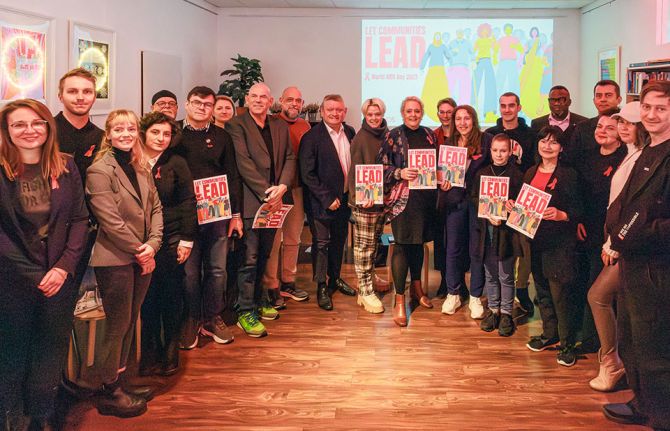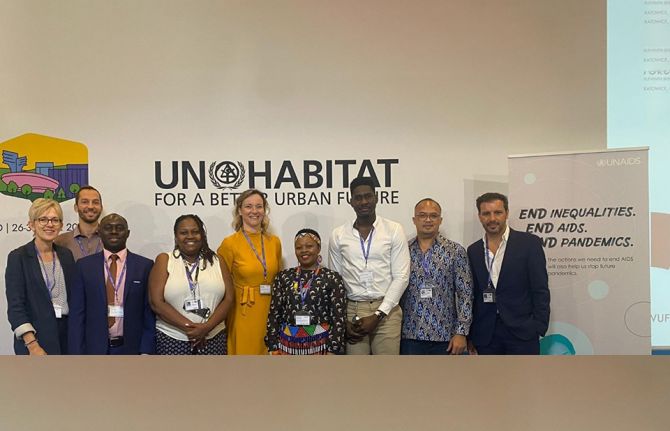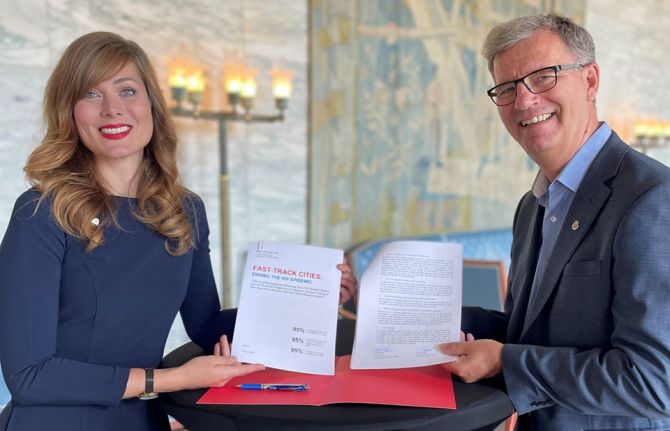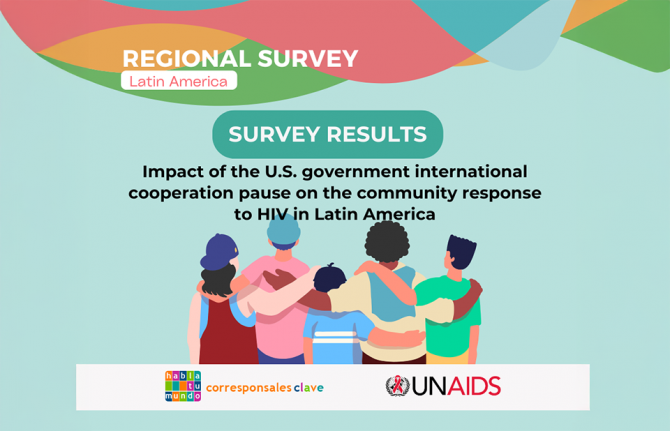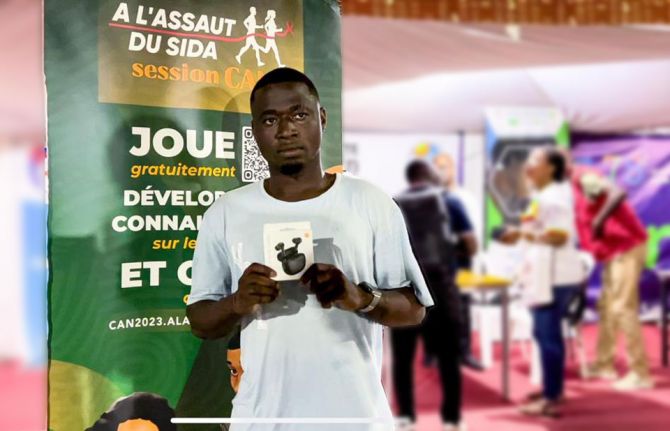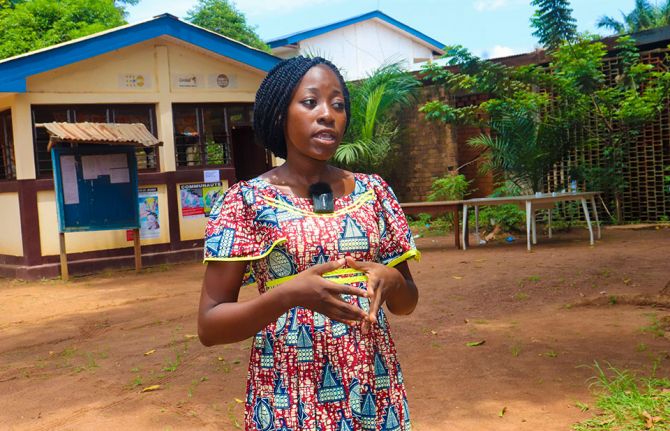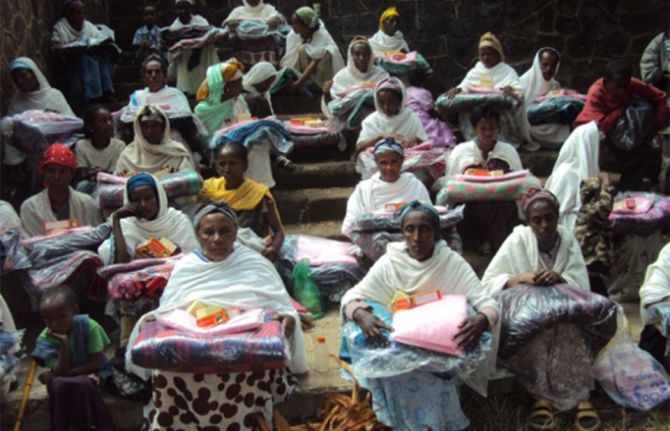
Feature Story
Housing Works to improve the lives of people living with HIV in the United States
28 October 2011
28 October 2011 28 October 2011
UNAIDS Executive Director Michel Sidibé with Housing Works client Matilda
Credit: Housing Works
In 2009 there were an estimated 1.2 million people living with HIV across the United States of America. In many cities across the United States large numbers of people living with HIV are also homeless. In New York one organization is working hard to address the twin crisis of HIV and homelessness.
Housing Works has been providing high quality services for homeless men, women and children living with HIV in and around New York City since 1990. The organization offers homeless people living with HIV essential services such as housing, medical, dental and mental health care, meals, job training, drug treatment and HIV prevention and treatment services. It is currently providing support to more than 20 000 homeless and low-income New Yorkers living with HIV.
The Executive Director of UNAIDS Michel Sidibé visited one of the centres run by Housing Works which provides HIV testing, counselling and treatment services in the heart of New York.
“HIV can affect people who are the most difficult to reach with HIV services,” said Mr Sidibé. “This project is an example of how an integrated approach to social welfare improves the lives of vulnerable people by providing them with hope and restoring their dignity.”
The centre, called Cylar House, pairs a medical clinic and adult day centre with a residential tower comprising of 36 apartments. In the same building Housing Works also run a food services business and a job training centre to help people living with HIV who are unemployed learn skills to return to work.
“Before I came to Cylar House I was homeless, using drugs, not taking HIV medication or taking care of my health,” said Matilda Echevarria, a 60-year-old resident. “Housing Works saved my life. Having my own place allows me to keep up with my medical and mental health appointments, to take my HIV medicines every day, and to feel good about myself.”
This project is an example of how an integrated approach to social welfare improves the lives of vulnerable people by providing them with hope and restoring their dignity
UNAIDS Executive Director Michel Sidibé
Housing Works’ pioneering job training programme at Cylar House teaches basic employment skills and guarantees graduates paid employment at Housing Works once students finish their studies. Nearly one third of Housing Works employees are graduates of the job-training program.
Anthony E.S. Jones, a former homeless person who was addicted to drugs is now clean and sober. He graduated from the job training program and is now employed as a Community Outreach Worker/Intake Coordinator for Housing Works. He explained how important a safe roof over his head was to his road to recovery, “Housing is a gateway to maintaining one’s overall health,” he said. Yvette Torres, Executive Director of Keith D. Cylar House added, “Having stable housing allows people to be able to focus on their health and well-being, not having to be pre-occupied with where they will sleep at night and whether they will be safe.”
The Cylar House HIV housing and treatment project has been replicated in several cities across the United States.
At the end of the visit a memorial ceremony was held to pay tribute to leading AIDS and Tuberculosis activist Winstone Zulu, who passed away earlier this month. Mr Zulu had stayed at the centre for several months after he became ill during a meeting he was attending at the United Nations.
“UNAIDS owes a debt of gratitude to Housing Works for opening its arms, it’s heart, it’s services and it’s healing community to Winstone in his time of need,” said Mr Sidibé. “The world also owes thanks to Winstone for bringing a face to the twin crises of HIV and TB. We need more heroes like Winstone Zulu and more organizations like Housing Works.”
External links
External links

Feature Story
HIV high on the agenda at World Health Summit
27 October 2011
27 October 2011 27 October 2011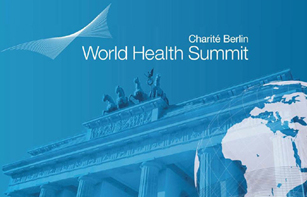
More than 1 200 leading figures from the worlds of science, politics, economics and civil society are at the World Health Summit taking place from 23 – 26 October in Berlin to discuss some of the major challenges in global health today.
Under theme Today’s Science - Tomorrow’s Agenda five main issues are being addressed at the conference: the impact of climate change on health; the rapid increase in chronic diseases in developing and industrialized countries; the worldwide burden caused by mental diseases; vaccine strategies; and international health policy.
HIV featured high on the agenda as one of the greatest health crises of modern times. The urgent need to integrate HIV with other health services was stressed along with the importance of comprehensive and sustained access to health for the billions of people in need.
UNAIDS Deputy Executive Director, Programme, Paul De Lay gave the key note speech on the third day of the conference and outlined the need to successfully integrate non-communicable diseases with HIV.
“It is critical to scale up the response to infectious diseases to save millions of people,” said Dr De Lay. “This is where the AIDS response can help. Thirty years of innovation, expertise and highly developed service platforms can successfully inform and be integrated with responses for non-communicable diseases.”
Dr De Lay also chaired a working session on the role of new technologies in HIV prevention which looked at how the scientific breakthroughs of the past year have added to the set of tools available to stop HIV transmission. The session focused on how, by using the most effective set of actions within an enabling environment, numbers of new HIV infections could be significantly reduced.
The recent scientific advances are initiating some essential changes in HIV prevention and treatment. The main question now is one of implementation and scale up
UNAIDS Deputy Executive Director, Programme, Paul De Lay
“We are at a very unique time in the HIV epidemic,” said Dr De Lay. “The recent scientific advances are initiating some essential changes in HIV prevention and treatment. The main question now is one of implementation and scale up.”
At the close of the summit a set of recommendations will be put forward to decision-makers from the relevant fields. Such recommendations will aim to address some of the urgent challenges in medical research, global health and health care delivery discussed at the conference.
External links
External links

Feature Story
Addressing the needs of young people critical as world population reaches 7 billion, says UNFPA report
26 October 2011
26 October 2011 26 October 2011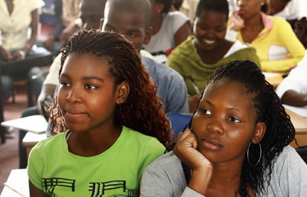
The State of World Population report highlights the importance of investing in young people and addressing their needs.
Within a matter of days, the world’s population is projected to reach 7 billion. This represents both a great challenge and a great opportunity. We can achieve a healthy and sustainable future for all if we act decisively now, according to the State of World Population Report 2011, published today by the United Nations Population Fund (UNFPA).
One of the calls to action in People and possibilities in a world of 7 billion, launched in more than 100 cities worldwide, is making sure that the needs of young people are addressed more effectively and that investing in their future is given a higher priority.
At the report’s launch in London, UNFPA Executive Director Dr Babatunde Osotimehin highlighted that reaching the world’s 1.8 billion people aged 10 to 24 is critical. “Young people hold the key to the future, with the potential to transform the global political landscape and to propel economies through their creativity and capacities for innovation,” said Dr Osotimehin. “But the opportunity to realize youth’s great potential must be seized now. We should be investing in the health and education of our youth. This would yield enormous returns in economic growth and development for generations to come,” he added.
Dr Osotimehin also noted that millions of adolescents in the developing world have little or no access to sexuality education and do not have sufficient knowledge to prevent pregnancies and protect themselves against HIV.
The report, which concentrates on individuals, organisations and communities working to improve conditions for themselves and those around them, shows a number of young people who are making a real difference.
We should be investing in the health and education of our youth. This would yield enormous returns in economic growth and development for generations to come
Dr Babatunde Osotimehin, Executive Director, UNFPA
In a chapter which describes youth as a “new global power reshaping the world”, Ethel Phiri is introduced as a 22-year old peer educator involved in youth outreach programmes in Mozambique. She runs bancadas femininas, discussion groups at schools, markets and other community areas around Maputo supporting young people with issues relating to sexual and reproductive health and HIV prevention.
People and possibilities in a world of 7 billion focuses on a wide range of population trends and their implications. It examines ageing populations, high rates of urbanization, poverty and inequality, environmental sustainability and rising international migration in a variety of countries with different contexts.
Although different countries are dealing with different challenges, the report maintains that the world must pull together to effect real and lasting change. “We all have a stake in the future of humanity,” stressed Dr Osotimehin. “Every individual, every government, every business, is more interconnected and interdependent than ever, so what each of us does now will matter to all of us long into the future. Together we can change and improve the world.”
Publications
Related
 “Who will protect our young people?”
“Who will protect our young people?”

02 June 2025

Feature Story
Megabits and MDGs: How broadband can work for greater good
25 October 2011
25 October 2011 25 October 2011
UNAIDS Executive Director Michel Sidibé participating at the “Megabits and MDGs" session of the Broadband Leadership Summit.
Credit: ITU
There is broad agreement that information and communication technologies (ICTs) can accelerate progress towards achieving the Millennium Development Goals (MDGs). But questions remain on how to scale up both access and content. This was the topic at hand for a plenary session at the Broadband Leadership Summit held in Geneva on 24-25 October 2011.
At the "Megabits and MDGs" session, President Pierre Nkurunziza of Burundi raised the issue of fostering partnerships to reach the country’s citizens with broadband access. According to President Nkurunziza, this would help accelerate e-government, e-learning, e-health and e-commerce.
His thoughts were echoed by Commodore Josaia Voreqe Bainimarama, Prime Minister of the Republic of Fiji faced with the task of reaching 890 000 people spread across 110 islands where “Broadband becomes a solution to overcome the challenge of distance.”
For Klaus Leisinger, President and CEO of the Novartis Foundation, broadband allows for more democratic access to knowledge.
It is absolutely critical that we engage youth at this level, not as recipients of our messages but the actors and creators of change. In this global movement we need more global citizens
UNAIDS Executive Director Michel Sidibé
Osman Sultan, CEO of Du, an integrated telecommunications company based in United Arab Emirates said that ICTs have become a basic human need and a basic human right. Mr Sultan stressed that old business plans would not work in this new ecosystem. “No one owns the customer,” he said while talking about how one can build a platform but the customers will decide how to use it.
The summit was organized by the International Telecommunication Union (ITU) and the Broadband Commission for Digital Development under the theme "Broadband for the Global Good". It explored how broadband infrastructure and services can be made to work to the benefit of developing countries.
The Broadband Commission on Digital Development
The Broadband Leadership Summit brought together a number of leading industry heads, various heads of state and governments, the heads of a number of international organizations and members of the ITU/UNESCO Broadband Commission for Digital Development.

UNAIDS Executive Director Michel Sidibé launching a new initiative run by young people, for young people, called “Crowd Out AIDS”
Credit: ITU
At the Summit, UNAIDS Executive Director Michel Sidibé launched a new initiative run by young people, for young people, called “Crowd Out AIDS”. Engaging through the most popular social media sites around the world and a Wiki platform, the UNAIDS Secretariat will ask young leaders to draft its new youth HIV strategy, debate, and then work with UNAIDS to implement it. It aims to reach more than 100 000 young people with the opportunity to input their ideas.
"It is absolutely critical that we engage youth at this level, not as recipients of our messages but the actors and creators of change," Mr Sidibé said. "In this global movement we need more global citizens.”
The Broadband Commission was established by ITU and UNESCO in May 2010 based on the increased belief that expanding broadband access in every country is key to accelerating progress towards the MGDs.
External links
External links
Related
 “Who will protect our young people?”
“Who will protect our young people?”

02 June 2025

Feature Story
UNESCO Youth Forum: Young people driving the HIV prevention revolution
21 October 2011
21 October 2011 21 October 2011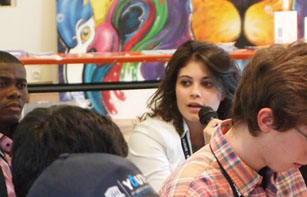
Lamia Jouini, engaging with fellow delegates in the café discussion on the third day of the UNESCO Youth Forum.
How can the world’s youth maximize their potential as dynamic agents of social, political and economic change to improve their lives, health and societies? The 7th UNESCO Youth Forum, held in Paris from 17 - 20 October, brought together nearly 250 youth delegates from 193 Member States and hundreds of civil society observers to try to find answers to this key question.
With the theme ‘How youth drive change,’ the Forum explored the myriad ways in which young people are reshaping the world. Three sub-themes looked at youth in political and public life, breaking through employment barriers, and countering youth exclusion, vulnerability and violence.
HIV remains a major area of vulnerability for young people, with 15-24 year-olds representing some 40% of new infections among adults worldwide. On the third day of the Forum, more than 30 youth delegates from around the world engaged in a ‘cafe discussion’ on HIV-related issues and AIDS activism.
During the session, organized by UNESCO, delegates were encouraged to contribute to the HIV response in their home countries. They shared diverse opinions and ideas, learning from each other’s experiences.
“I didn’t even know that there was such a thing as a female condom! It just shows the lack of information,” said Lamia Jouini from Tunisia with a slight laugh, a member of the International Federation of Medical Student’s Association. On a more serious note, she added, “The HIV situation is bad in many countries—we should really adjust our work to the needs of young people.”
The wide-ranging discussions touched on issues such as stigma and discrimination, lack of good-quality sexuality education in schools and access to commodities such as quality condoms.
I was really impressed with the work young people are doing to educate themselves and their peers, challenging stigma!
Joanna Herat, a programme specialist in the HIV and AIDS section with UNESCO.
“I was really impressed with the work young people are doing to educate themselves and their peers, challenging stigma,” said Joanna Herat, a programme specialist in the HIV and AIDS section with UNESCO, who facilitated the discussion. “Many of the delegates left the session with a strong sense of dedication to advocate for HIV-related education in their home countries.”
Developing a symbiotic relationship between young people and UNESCO as an organization was also seen as critical. Delegates took the opportunity to tell UNESCO representatives about their needs and priorities as advocates and beneficiaries. The UN agency, in turn, was able to identify activists and follow up with them for peer engagement and leadership development opportunities.
The café discussion reflected the aspirations of the 7th UNESCO Youth Forum as a whole: to encourage youth to be a force that makes a difference in the world and to be a force that drives change.
External links
External links
Related
 “Who will protect our young people?”
“Who will protect our young people?”

02 June 2025

Feature Story
World forum in Brazil seeks to close health equity gaps
20 October 2011
20 October 2011 20 October 2011
Panelists at the side event “The Politics of Health” included (from left to right): Dr. Aaron Motsoaledi, Minister of Health, South Africa; Dr Jarbas Barbosa, Brazil’s Vice-Minister of Health; UNAIDS Executive Director Michel Sidibé; Ms Amina Ibrahim, Chief Executive Officer, Center for Development Policy Solutions, Nigeria.
High-level government officials, medical experts and civil society representatives from 120 countries are gathered in Rio de Janeiro, Brazil, at a three-day meeting focused on the social, economic and political conditions that drive health inequities. Convened by the World Health Organization (WHO), the World Conference on Social Determinants of Health provides a global platform for discussion on a range of topics, including early child development, universal health care, social protections, fair financing, gender equity, political empowerment and global governance.
In a panel session at the conference entitled "Politics of Health: Lessons from the AIDS movement to address the social determinants of health,” UNAIDS Executive Director Michel Sidibé emphasized the need for a greater focus on the underlying dynamics that fuel health inequities. "AIDS has taught us about the need to address social inequities that put women, children and vulnerable populations at risk for HIV," said Mr Sidibé, who chaired the session, together with Brazil's Vice-Minister of Health, Dr Jarbas Barbosa.
Dr Aaron Motsoaledi, South Africa’s Minister of Health underlined the importance of partnerships in addressing the national HIV epidemic. “We have 19 sectors represented in the South African National AIDS Council, chaired by the Deputy President. When we aim to address the social determinants of health, these groups are essential to mobilize all aspects of our society," he said.
The differences within and between countries, in income levels, in opportunities, in health status, and in access to care are greater today than at any time in recent history.
Dr Margaret Chan, Director-General of WHO
Noting the struggle for health and human rights in Brazil, Vera Paiva, Professor of Social Psychology at the University of Sao Paolo said that the mobilization and participation of people affected by HIV has helped ensure the protection of human rights within the country’s HIV response.
Ms Amina Ibrahim—Chief Executive Officer of the Center for Development Policy Solutions in Nigeria and former Special Advisor to the President of Nigeria on the Millennium Development Goals (MDGs)—underscored that political commitment can become “lost in translation” between policy and action. To lessen the implementation gap, she said that Nigeria is devoting considerable effort to briefing ministries and parliamentarians and providing them with evidence of how investing in education, gender and other MDGs benefits their constituents.
According to WHO there is ample evidence that an individual's health status is largely determined by his or her socio-economic position. "The differences within and between countries, in income levels, in opportunities, in health status, and in access to care are greater today than at any time in recent history," said Dr Margaret Chan, Director-General of WHO, at the opening plenary of the conference. "A world that is greatly out of balance in matters of health is neither stable nor secure," she added.

During the conference, the UNAIDS Executive Director congratulated Finland’s Minister of Health, Maria Guzenina-Richardson, on her successful role as Vice-President of the Conference. They reflected on areas for mutual collaboration between UNAIDS and the Government of Finland on health promotion, young people and vulnerable populations.
In recent years, the Government of Brazil—host of this week’s conference—has made major strides in improving the health and well-being of its population. Through the publicly-funded Sistema Único de Saúde, every Brazilian is entitled to free health care, from routine check-ups to complex surgical procedures. Nearly all people living with HIV in Brazil who are eligible for antiretroviral treatment now have access. The Government has also taken bold action to address stigma and discrimination, most recently through the launch of a pioneering anti-homophobia campaign.
Speaking at the opening plenary, Alexandre Padilha, the Brazilian Minister of Health, related that in the 23 years since Brazil adopted its democratic Constitution, the country has faced many crises, but has never given up its commitment to providing universal access to medical services free of charge. Brazil, he said, would not allow the current economic crisis to change this.
Following the opening plenary, the UNAIDS Executive Director participated in a High Level Round Table alongside Dr Margaret Chan of WHO, Rebeca Grynspan of the United Nations Development Programme, U.S. Secretary of Health and Human Services Kathleen Sebelius, and Tereza Campello, the Brazilian Minister of Social Development.
Calling attention to the seismic political shifts occurring in the global North and South, Mr Sidibé noted that the old rules of development no longer apply. “The world is changing! Countries like Brazil and South Africa have shown that policies founded in respect for all of their people, and that distribute opportunity fairly, bring dynamism and growth that is good for all,” he said.
At the end of the conference, governments are expected to endorse a Rio Political Declaration on Social Determinants of Health outlining their pledges to improve the social conditions that affect people's health.
Publications
Publications

Feature Story
Adapting to today’s epidemic: UNESCO launches its new AIDS Strategy
18 October 2011
18 October 2011 18 October 2011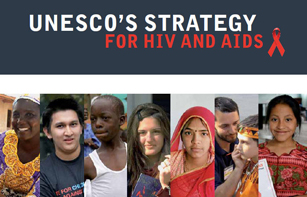
UNESCO’s new AIDS strategy intends to meet the needs of the changing face of the AIDS epidemic.
The United Nations Educational, Scientific and Cultural Organization (UNESCO) recently launched a new AIDS strategy intended to meet the needs of the changing face of the AIDS epidemic.
The strategy articulates UNESCO’s contribution to the UNAIDS strategy Getting to Zero, and calls for the need to accelerate universal access to HIV prevention, treatment, care and support.
“All parts of the Organization are mobilized at the global, regional and country levels, through activities that are culturally appropriate, gender transformative and evidence-based. This cross disciplinary approach is our signature strength and it is well-suited for tackling HIV,” said UNESCO Director-General Irina Bokova.
The launch event was chaired by Qian Tang, UNESCO Assistant Director-General for Education, who was joined by Jan Beagle, UNAIDS Deputy Executive Director, Management and External Relations and Mark Richmond, UNESCO Global Coordinator for AIDS.
Other presenters included Lady Cristina Owen-Jones, UNESCO Goodwill Ambassador for HIV Prevention Education, Nobel Laureate Dr Luc Montagnier, Patricia Machawira, UNESCO Regional AIDS Advisor for East and Southern Africa and Pablo Torres Aguilera, Young People Living with HIV Officer at Dance4Life.
All parts of the Organization are mobilized at the global, regional and country levels, through activities that are culturally appropriate, gender transformative and evidence-based. This cross disciplinary approach is our signature strength and it is well-suited for tackling HIV
UNESCO Director-General Irina Bokova
Speaking at the launch, Ms Beagle commended the new UNESCO strategy and the key role the organization plays in promoting the education sector engagement in national AIDS responses. “The UNESCO AIDS Strategy addresses critical challenges in protecting young people from HIV infection and places particular emphasis on the promotion of comprehensive HIV responses in the education sector.”
In the new strategy, HIV prevention education will be integrated within the context of wider health promotion to ensure that all girls and boys, and young women and men, have access to comprehensive health education. Furthermore, UNESCO strategy outlines three priority areas:
• Building country capacity for effective and sustainable education sector responses to HIV;
• Strengthening comprehensive HIV and sexuality education;
• Advancing gender equality and protecting human rights.
UNESCO hopes that its new AIDS strategy will reinforce the pivotal role of the education sector in a successful AIDS response. With knowledge about HIV and health issues provided in a nurturing and enabling environment, young people can make more informed choices about how to live safer and healthier lives.
External links
External links
Publications
Related

Feature Story
People living with HIV in Ethiopia receive vital nutrition boost
18 October 2011
18 October 2011 18 October 2011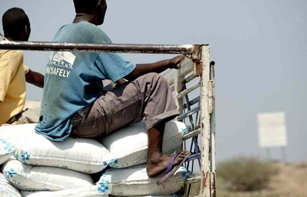
Credit: UNAIDS/P.Virot
Men, women and children on HIV treatment in drought-affected Ethiopia will benefit from a US$ 56 million donation from the US President’s Emergency Plan for AIDS Relief (PEPFAR) to the World Food Programme (WFP).
The donation will allow the UN agency to increase vital nutritional support to people on HIV treatment—who are often already weakened by malnutrition—and their families. Spread over five years, it is the largest contribution ever made from PEPFAR to WFP.
Welcoming the donation, Josette Sheeran, WFP Executive Director emphasized that the provision of the right nutritional support for people on HIV treatment “can make the difference between life and death. Because when malnourished people do not have the right food to eat, treatment does not work.” She added that WFP would now be able to reach more people; assisting families affected by AIDS with sustainable food security and helping to eliminate new HIV infections among children and keep their mothers alive.
Supporting children living with HIV by helping ensure good nutrition is a key concern which echoes the WFP’s new global initiative to mark World Food Day: ‘Feed a child, feed a dream’. Through an online platform, the initiative highlights the aspirations of some of the many children being supported by WFP around the world and how they can be met.
WFP will now expand its areas of operation into the country’s least developed regions of Afar, Benishangul Gumuz, Somali and Gambella to improve the nutritional status, treatment success and quality of life of people on HIV treatment and their families.
At present WFP supports HIV treatment in urban areas, including assessments, counselling and food assistance for those who are malnourished. From 2008 to 2010, an estimated 355 000 people living in households affected by AIDS in 23 towns benefited from these activities. With PEPFAR’s donation, WFP can reach an additional 375 000 people living in households affected by AIDS—those that are most vulnerable to malnutrition and food insecurity—over the next five years.
The entry criterion for the receipt of food aid is the nutritional status of the individuals as measured by body mass index for example. All people on antiretroviral therapy (ART) receive nutrition education and counselling, and only those who are malnourished will receive food rations for a period of six months. Experience has shown that nutritional recovery (>85% weight for height) occurs rapidly when ART is combined with food assistance.
Food and nutrition assistance is an essential and cost-effective means of enhancing the success of antiretroviral treatment (ART), enabling nutritional recovery and mitigating the socio-economic consequences of HIV and tuberculosis. Furthermore, this type of assistance increases the likelihood that patients will adhere to treatment, thereby reducing the likelihood that additional, more costly treatments will need to be found.
WFP is the largest humanitarian agency fighting hunger worldwide. It feeds more than 90 million people in over 70 countries every year. In 2010, WFP supported 2.5 million beneficiaries in nearly 50 countries through its HIV and Tuberculosis (TB) programmes. This included food and nutritional support to some 500,000 people living with HIV as part of their antiretroviral therapy or TB treatment.
External links
Publications
Related

Feature Story
Luxembourg stands firm in its commitment to HIV
14 October 2011
14 October 2011 14 October 2011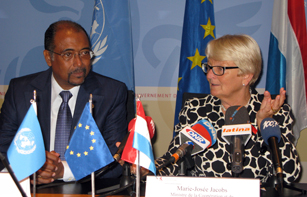
UNAIDS Executive Director Michel Sidibé and Luxembourg’s Minister for Development Cooperation and Humanitarian Affairs, Marie-Josée Jacobs.
UNAIDS Executive Director Michel Sidibé commended the country’s contribution to the AIDS response and its support to UNAIDS at a meeting with the Minister for Development Cooperation and Humanitarian Affairs, Marie-Josée Jacobs in Luxembourg.
“The Government of Luxembourg has been a longstanding partner in the global AIDS response and has shown strong leadership through its engagement in social justice against social disparities,” said UNAIDS Executive Director Michel Sidibé.
During his visit Mr Sidibé also met with the Minister of Health, members of parliament, senior officials from the Directorate for Development Cooperation of the Ministry of Foreign Affairs and representatives from youth groups.
Since the beginning of the epidemic Luxembourg has been committed to the AIDS response and supports many programmes around the world. The country is expanding its response to HIV and is focusing on gender equality and stopping new HIV infections among children with special emphasis on women and girls and young people.
"Besides its bilateral commitments in public health and more specifically in the response to AIDS, Luxembourg maximizes the impact of its international development cooperation by working with strategic partners such as UNAIDS,” said Minister Jacobs. “Luxembourg will focus its efforts on three tracks which are crucial for the global AIDS response: HIV prevention, treatment and research.”
The Government of Luxembourg has been a longstanding partner in the global AIDS response and has shown strong leadership through its engagement in social justice against social disparities
UNAIDS Executive Director Michel Sidibé
From 2005 to 2011, Luxembourg has contributed more than EUR 32.8 million to the work of UNAIDS. Today its commitment to AIDS is stronger than ever, with financial commitments remaining firm despite difficult economic times.
During the UN High Level Meeting on AIDS in June 2011, Minister Jacobs chaired a pivotal panel on HIV prevention. Mr Sidibé commended her engagement and briefed her on current issues including Treatment for Prevention, Treatment 2.0 and the important link between HIV and non-communicable diseases. He also emphasized that UNAIDS will continue to work closely with Luxembourg to ensure that AIDS remains high on global political agenda and that the progress made to date is not put in jeopardy.
The visit concluded with a conversation with youth representatives. Mr Sidibé emphasized the importance of strengthening the leadership of young people in the global AIDS response as well as the need for a prevention revolution to break the trajectory of the epidemic. "Young people don't want to be passive beneficiaries but active players for change. They are refusing to accept stigma and exclusion.”
Related

Feature Story
Medicines Patent Pool helps make antiretroviral medicines more widely available
14 October 2011
14 October 2011 14 October 2011
Credit: UNAIDS
Aurobindo Pharma and MedChem have become the first producers of generic antiretroviral medicines to join the Medicines Patent Pool. By joining the Pool, the two manufacturers are able to take advantage of the agreement signed between Gilead Sciences and the Medicines Patent Pool in July 2011. The July agreement made Gilead’s intellectual property on four antiretroviral medicines available to the Patent Pool for licensing to generic manufacturers.
Through the new agreement, both pharmaceutical companies have signed up to produce emtricitabine, cobistat and elvitegravir and the combination pill called the ‘Quad’ which contains tenofovir, emtricitabine, cobistat, and elvitegravir. In addition, generics manufacturer MedChem has also chosen to produce tenofovir.
Aurobindo is already a major producer of generic antiretroviral medicines, and was previously manufacturing tenofovir under a separate voluntary license granted directly from Gilead Sciences which carried restrictions to distribute to several countries. Through a key provision in the Medicine Patent Pool’s licenses, Aurobindo was able to end its previous agreement with Gilead. This will now allow Aurobindo to independently produce tenofovir, which is off patent in India and directly distribute it to a wider number of countries than the previous license had permitted. This should help to make tenofovir more widely available at a lower cost.
UNAIDS strongly encourages other antiretroviral patent holders to establish agreements with the Pool, and for generic manufacturers to utilize the licenses that the Pool can facilitate to expand access to antiretroviral treatment
Paul De Lay, UNAIDS Deputy Executive Director, Programme
“We congratulate the Medicines Patent Pool for completing this agreement with Aurobindo and Medchem,” said Paul De Lay, UNAIDS Deputy Executive Director, Programme. “UNAIDS strongly encourages other antiretroviral patent holders to establish agreements with the Pool, and for generic manufacturers to utilize the licenses that the Pool can facilitate to expand access to antiretroviral treatment.”
There are currently an estimated 6.6 million people receiving antiretroviral treatment in low- and middle-income countries around the world. However a further 9 million people who are eligible for treatment still do not have access.
The Medicines Patent Pool was established in 2010 with the support of UNITAID. It aims to increase access to newer antiretroviral medicines by creating a pool of patents and intelligence on antiretroviral production donated by medicine producers. It is currently in negotiations with a number of other patent holders and producers.




